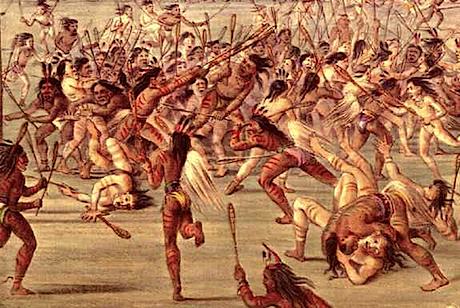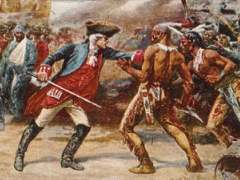The Cherokee and the Wars of the 18th Century
Dan Bryan, March 26 2012
Divisions opened up amongst the Cherokees, with several different causes.
There were French traders as well as English, and different towns were more kindly disposed towards one or the other of these two sides. Some viewed the English as the stronger side in the competition, but others foresaw encroachment and conflict from that group.
Some of the Cherokee were appalled at the changes to society occurring in the face of contact with the white men. They saw only dependency and sloth. They spoke out against the alcohol and the trading goods. They were upset that traders were marrying Cherokee women and challenging the matriarchal social structures. They looked upon the religion of Christianity with disdain. Other Cherokee of course, participated in these changes and did not seem to be too troubled by the implications.
This led to disputes between those who wished to strike back at the ever-spreading settlements of the English, and those who favored cooperation. The former group tended to be the more culturally conservative, spartan group of the two. The latter group was usually more prosperous and benefited from the trading system or saw few alternatives.
The shrinking Cherokee land base
The land treaties and cessations of different strips of Cherokee territory are too numerous to keep track of, or to list in an orderly fashion, without wasting a large amount of space. It is sufficient to note that as white settlement expanded into Georgia, and through to the base of the mountain ranges where the Cherokee lived, that a number of treaties were signed under dubious circumstances, and that the Cherokee continued to be pushed to the south and west.
By the 1750s, white settlers were passing through the mountains and building small communities near the Tennessee River and its tributaries. These settlements were illegal according to English law, but those laws were difficult to enforce.
These were the settlements that most infuriated the militant wing of the Cherokee.
The "French and Indian" War, and the Cherokees' disastrous participation
In 1756, a war broke out between the French and the English. Agents of either side sought the Cherokee to make their argument, but the English convinced the majority. They did so not by arousing sentiments against the French themselves, but simply by pointing out that the hated Shawnee tribe had sided with them. They then offered the Cherokee leaders money, guns, and trading goods for their support.
Things did not go smoothly in this alliance. The English constructed two forts in Cherokee territory, to defend it while the Cherokee warriors went north into the lands of the Shawnee. Somehow this band ended up without supplies and started to live off of the land in western Virginia, foraging for horses and food. This just so happened to be white country and soon the two groups were killing each other, since the rural settlers were not apprised of the Cherokees' status as allies.
Things were hardly smoothed over before the militant Cherokee -- led by Dragging Canoe -- attacked the English forts and settlements, extracting a surrender at Fort Loudon. Discovering that the English hid weapons before they surrendered, the Cherokee were angered and massacred as many as they could while the English were escaping their territory.
The passions of the English thus inflamed, reprisals were forthcoming. Nearly all of the Lower Towns were wiped out, and militias moved against the other towns in the hills until the Cherokee were very much reduced in number. Women and children on both sides were killed, tortured, and even burned at the stake (in the case of one unfortunate English boy). In this barbarous struggle, however, the Cherokee were vastly outnumbered and they were forced to beg for peace before they were wiped out.
A new settlement line was demarcated by the Proclamation of 1763, and just as quickly settlers began moving to the other side of it, again in violation of English law.
A second war and more disaster for the Cherokee
Another war came in 1775. This time the settlers were in rebellion against their own government. The decision of who to support in this struggle was an easy one for the Cherokee. While the English king and government were far distant, they had been much more fair in their dealings than the trespassing settlers. The Cherokee held out hope that perhaps, just maybe, if the settlers lost this struggle, then the English could force them to leave the land and move back to the east.
The settlers, for their part, knew that if they won in their rebellion, they would be landowners and not mere squatters. They already hated the Cherokee and the fact that this tribe allied itself with the English crown only served to aggravate those emotions.
It seemed like the Cherokee had a knack for being on the wrong side of every struggle, and this one was no different. Militias from four different states descended upon their territory and destroyed many villages outright, which would never be resettled by the Cherokee. In fact, they lost so much land by the end of the 1700s that they were only living in a fraction of their former area. They were largely confined to the southern part of Tennessee, and more so to northern Georgia.
The hunting and trading of furs had died down commensurably since the early 1700s. This way of life which had briefly provided the Cherokee with prosperity dwindled and left them seeking a new way of filling their economic needs.
Recommendations/Sources
- "The Cherokee Nation official website and history"
- Robert J. Conley - The Cherokee Nation: A History
- Grace Steele Woodward - The Cherokees (The Civilization of the American Indian Series)


